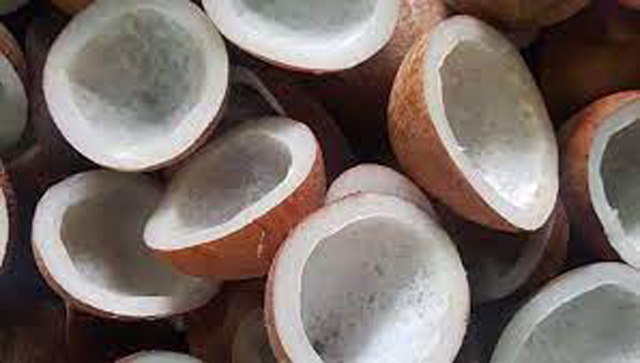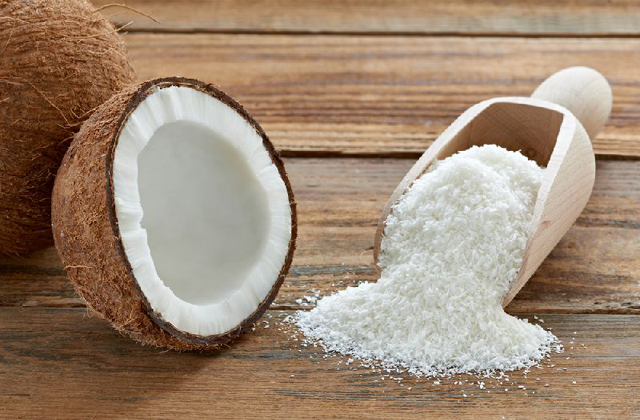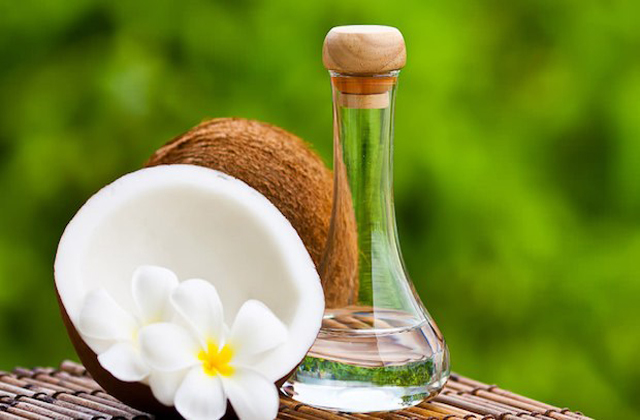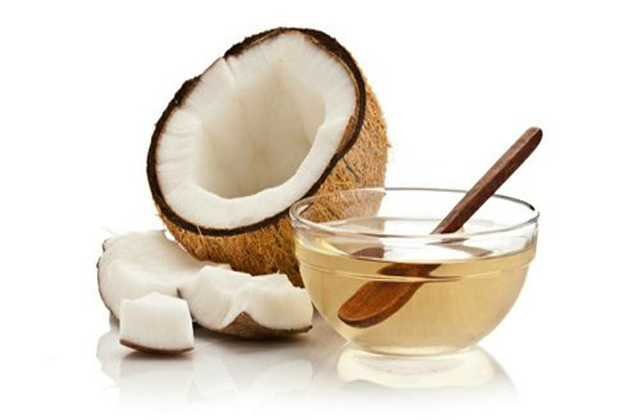Coconut
About 75% of the world's supply of coconuts is produced by Indonesia, the Philippines, and India combined. During the fiscal year 2020, volume of coconut produced in India accounted for over 14.19 million metric tons.
You might wonder, is a coconut truly a nut? The reality is, a coconut may be classified as a nut, a fruit, or a seed, depending on the criteria you use. In the culinary world, coconuts are generally viewed as fruits. They are known for adding a sweet, nutty — perhaps even tropical — flavor to dishes. Coconuts grow on palm trees with the scientific name Cocos Nucifera. They likely originated in India and Southeast Asia. Today, coconuts grow in warm climates across the globe, such as the Caribbean and parts of Africa and South America. Coconut meat is the edible white flesh lining the inside of a coconut, also called the "kernel." Coconut meat can be used to create coconut oil, coconut cream, coconut milk, and dried coconut. Of course, you can eat it fresh, too. Research suggests that coconut meat provides nutritious fats and various other potential health benefits. Coconut is generally regarded as a source of healthy fat. The meat contains protein and fiber, as well as some essential minerals such as Iron, Manganese, Copper, Magnesium. coconut as part of traditional medicine such Counteract some poisons, protect against disease, Ease inflammation, Kill bacteria. Researchers have studied the potential health benefits of coconut is Improve endurance, give better oral health, help you lose weight etc.

Copra
dried coconut kernels from which coconut oil is expelled.[1] Traditionally, the coconut kernels are sun-dried, especially for export, before the oil, also known as copra oil, is pressed out. The coconut fruit, when de-husked is essentially a drupe that is obtained from a tropical feather-leaved palm tree—the Coconut palm (Cocos nucifera). The oil extracted from copra is rich in lauric acid, making it an important commodity in the preparation of lauryl alcohol, soaps, fatty acids, cosmetics, etc. and thus a lucrative product for many coconut-producing countries. The palatable oil cake, known as copra cake, obtained as a residue in the production of copra oil is used in animal feeds.

Desiccated Coconut - High Fat
Coconut meat which has been shredded, chipped or powdered and then dried out is called desiccated coconut. It is prepared by removing natural moisture in the coconut fruit. It has a snow-white appearance with a fresh sweetness and nutty flavor. It is used in making cookies, cakes, pastries, desserts, puddings or any other coconut-based recipe where raw grated coconut cannot be used. Desiccated coconut has a very high fat content but low cholesterol and sodium. The health benefits of a desiccated coconut are like fresh coconut. It is100% natural and contains only coconut!! Ideal replacement for freshly grated coconuts.
Desiccated Coconut is a grated, dried (3% moisture content max.), and unsweetened fresh meat or kernel of a mature fruit of coconut. Desiccated Coconuts are graded cutting size fine grade. The processes of desiccated coconut are Removal of coconut husk, Removal of coconut shell, Removal of thick brown coconut skin, Washing of white coconut meat to remove foreign material, Cutting of white coconut meat into the desired size, Hot air blow drying the grated white coconut meat to reduce the moisture content from 19% to less than 3%, Cooling of desiccated coconut and Finally, packing of desiccated coconut. Production of Desiccated Coconut is a real hard work as the removal of coconut husk, shell and skin are done manually or Remain until Package we are using latest technology machineries which is operated by Fully automatic for fast & hygienic.

Desiccated Coconut - Low Fat
Coconut meat which has been shredded, chipped or powdered and then dried out is called desiccated coconut. It is prepared by removing natural moisture in the coconut fruit. It has a snow-white appearance with a fresh sweetness and nutty flavor. It is used in making cookies, cakes, pastries, desserts, puddings or any other coconut-based recipe where raw grated coconut cannot be used. Desiccated coconut has a very high fat content but low cholesterol and sodium. The health benefits of a desiccated coconut are like fresh coconut. It is100% natural and contains only coconut!! Ideal replacement for freshly grated coconuts.
Desiccated Coconut is a grated, dried (3% moisture content max.), and unsweetened fresh meat or kernel of a mature fruit of coconut. Desiccated Coconuts are graded cutting size fine grade. The processes of desiccated coconut are Removal of coconut husk, Removal of coconut shell, Removal of thick brown coconut skin, Washing of white coconut meat to remove foreign material, Cutting of white coconut meat into the desired size, Extraction of the milk and Hot air blow drying the grated white coconut meat to reduce the moisture content from 19% to less than 3%, Cooling of desiccated coconut and Finally, packing of desiccated coconut. The fat content of this product can vary but is usually in the range of 45% - 55% is a reduced fat Desiccated Coconut. Production of Desiccated Coconut is a real hard work as the removal of coconut husk, shell and skin are done manually or Remain until Package we are using latest technology machineries which is operated by Fully automatic for fast & hygienic.

Virgin Coconut Oil
In the oil industry the word 'virgin' actually refers to a specific technicality and is worth knowing about before making any purchase decision. Coconut oil, or any oil for that matter, can only use the term 'virgin' if it has been cold pressed, ie the oil has been extracted from the flesh using physical force only. This type of oil is also referred to as the 'first press', because this is the oil that comes out of the flesh first, and normally requires little effort to extract.
Virgin coconut oil preserves the virtues of the coconut milk and does not let it get harmed by the heating processes that regular coconut oil undergoes. This is made possible via cold-processed technology, which exterminates the need of heating elements in the coconut milk extraction process and ensures its natural goodness remains intact. Virgin coconut oil is extracted from the fresh milk of coconut using cold process which maintains all the natural constituents, aroma, and antioxidants of the oil. Virgin coconut oil is rich in medium-chain fatty acids, has good cholesterol and almost negligible amounts of trans fatty acids.
Benefits of virgin coconut oil :
• Virgin coconut oil helps in healthy functioning of the thyroid and endocrine systems and increases the body’s metabolic rate; hence helping in reducing weight.
• Virgin coconut oil moisturizes and nourishes the scalp with essential proteins and repairs the damages thus giving the hair its natural shine and radiance.
• Virgin coconut oil is abundant in Vitamin E and is not only a wonderful face cleanser, moisturizer and sunscreen, but it can treat many skin disorders such as eczema and dandruff.

EDIBLE COCONUT OIL
copra, dried sections of the meat of the coconut and the coconut oil extracted from it. Naturally growing coconut palms are a significant source of copra, but commercial estates and plantations now predominate. The nuts are husked by bringing them down forcibly on a sharp point, by hand or mechanically. The shell is then cracked, usually into two halves, with a chopping knife, exposing the meat, which is about 50 percent water and 30 to 40 percent oil. Exposing the kernels to the air and sun was the earliest method of drying and is still extensively followed; it gives a good quality white copra. More uniform quality copra is produced by hot-air drying, first introduced in India and the Samoan islands. The copra is drawn through a heated tunnel, meeting a countercurrent of hot air. A fine, white copra of higher value than the sun-dried product is obtained. Well-dried copra contains 4 to 5 percent moisture and 63 to 70 percent oil.

